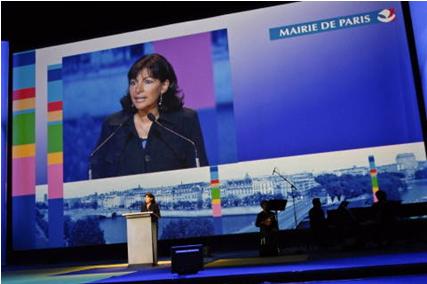A considerable vehicle of economic development, which bestows on us the collective duty to contribute to the development of facilities in developing countries and countries in transition, the road of the 21st century must also be conceived in innovation, respecting the environment and future generations.
As many issues as humanity must urgently face, at a time when each and every one of us must be able to take their share of world prosperity, but when also, at last, sustainable development and the fight against climate change have made their way into the core of all debates.
Paris is more than happy to accommodate your World Congress since you have chosen a topic that is dear to this city: sustainable development.
Indeed, since 2001, under the impetus of Mayor Bertrand Delanoe, Paris demonstrated her actions in a voluntary step towards sustainable development, at first related to the fight against pollution. Thus, we gave the priority to public transport, with bus corridors, cycle lanes, the tram, today Vélib1, tomorrow the river shuttle and a prolonged tram. We have, with the Board of transport - Syndicat des Transports d'IIe de France (STIF) and the Regional Council, made it so that there are now more buses and subways, etc.
This priority given to public transport resulted in these first positive results: between 2002 and 2007, the nitrogen oxide emissions (the local pollution) dropped by 32% while the carbon dioxide pollutants (due to the result of car manufacturers developing less polluting vehicles), greenhouse gas emissions responsible for global warming decreased by 9 %. Nevertheless, nowadays vehicles prove often more producers of greenhouse gas.
To continue on this path, we put in place today, our territory Climate Plan, "The Paris Climate Plan" with the objective to decrease the level of greenhouse gas emissions in the Paris region by 25 % by 2020. We have as an ambition that Paris will be the first mega-city to strictly follow the European standards in the field of the gas pollution and greenhouse gas emissions.
But all the efforts which we have started are not enough to address all of the issues. In order to obtain both dynamic and harmonious development, the great cities cannot stand alone. To properly solve the question of transport is essential to the attractiveness of the regions. The needs for financing in the domain of collective transport are immense, and it is urgent that the State, in particular ours, propose new resources. In Paris city, the issue is more around public transport, but in the Ile de France (greater Paris region), in the départements furthest away from the heart of the city, the roads are a topic which is impossible to circumvent. It is thus necessary for us to reinforce and modernize existing transport, to improve the services between suburbs.
I hear that private public partnerships would be the solution to all problems. I am obviously favourable of this, we already do it in Paris, but the involvement of the State is essential to this matter, without that we are heading for failure. The State must strongly support the efforts of the local authorities and the private actors. Paris, a member of the UCLG2, knows how much the communities worldwide are implicated in the policies of travel and sustainable development. Beyond the financial question, the State must also support the development of clean vehicles, by proposing more demanding environmental standards, and encouraging innovative forms of mobility, like car sharing.
I sincerely hope, in France, that the "Grenelle of the environment", a roundtable discussion organized in October by the Minister of State, Mr Borloo, can lead to concrete solutions, so that the fight against global warming is really fruitful.
Thus, I particularly appreciate that the organizers of this 23rd World Road Congress have chosen to direct the debates around the topic of the sustainable development. I am convinced that your exchanges will allow a useful and essential sharing of experience and knowledge, but also allow rich discoveries, meetings and I am sure, intense moments of friendliness.
I thank you!
1 Time share rental bicycle scheme
2 United Cities and Local Governments
